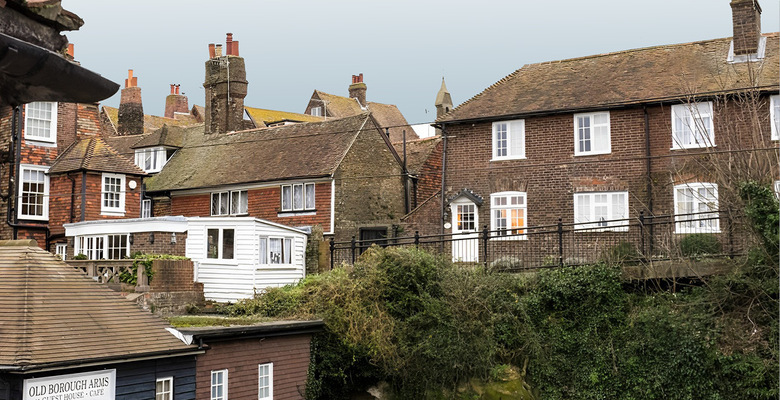
Savills Real Estate predicts the cost of housing in Britain will increase by 2.5% in 2024 and that by the end of 2028, property prices in the country will have grown by another 21.6%, (for an average property, this is an increase in value of £61,500). Why do analysts predict rising prices at a time when fewer people are buying houses? What might lie behind these price increases? Why, during a housing shortage, are developers cutting the volumes of new housing being built? In an interview with Kommersant UK, Herman Abel, the founder and executive partner of InDome Capital, an investment company specialising in financing real estate projects in Britain, gave us an update on trends in the property market and changes in the construction industry.

What changes have there been in the housing market since the start of the year?
Over the last 12 months, a contradictory situation has developed in the property market. On the one hand, a mammoth housing shortfall remains, with more than a million more housing units needed, and on the other, demand for property is wavering; we had growth for a few months, then a slight drop (prices were down 0.4% in March). Overall, the market is currently in the doldrums. Housing prices are now 4% lower than they were at their peak during the post-Covid period, which was caused by low mortgage rates, a large amount of money on the market and the resultant inflation.
The lack of activity in the property market is primarily due to the unaffordability of mortgages, as interest rates have almost tripled in the past ten years. Most people in Britain buy property with a mortgage and their low affordability is a limiting factor which hampers market growth. However, despite this, experts are predicting an imminent increase in housing prices.
Renting costs have grown at a furious pace over the last two years; last year they were up 12%, this year they’re already up another 8% and the choice of properties available to rent is quite limited. The high demand is affecting the housing quality, which is only deteriorating. So the demand for rented accommodation is high, as is the price, but the demand to buy housing is low.
The fastest way to change the situation is to reduce mortgage rates. In terms of prices alone, without considering the accessibility of mortgages, housing is the most affordable it has been in 20 years. After Covid, there was a large surge in inflation and prices for all goods and services grew by 20%. What’s more, employers compensated for the rise in the cost of living by increasing salaries. At the same time, the cost of housing isn't growing; it actually fell for a while. Consequently, property prices in Britain are now 14% lower than they were at their peak.
But there should always be a balance on the market between the price of renting and the cost of buying property. This has now been lost as renting costs have grown by over 20% over the last two years while, in the country as a whole, the cost of purchasing a home has fallen.
In London, the price of purchasing property is now growing more slowly, at 0.1% a year and this rate is falling. Housing is already expensive here. The price of renting housing in the capital has risen dramatically. Nationwide, the picture is somewhat mixed. In some regions, where it had previously been relatively inexpensive, the price of buying housing has in fact risen. According to the mortgage lender Halifax’s figures, in the North West of England, the cost of buying a home has grown by 3.3% over the last year. In Wales, the growth is 1.1%, in Northern Ireland, prices are up by 3.4% while in Eastern England, they have fallen by 1.1%.
What about construction volumes? Has the rate increased or slowed? How much social housing is being built?
The number of new developments begun this year is record-breakingly low. In the first quarter, work began on 24% fewer new developments than in the same period in 2023. But the amount of social housing built was 43% down compared to the last quarter of 2023 and was 40% lower than in the first quarter of last year. So major companies have significantly reduced volumes as they are unsure how quickly the market will begin to recover. This suggests the housing shortage will only grow as will the systemic imbalance between supply and demand. So in the long term, a growth in property prices is inevitable.
Why, when real estate prices are so high in Britain and there is a palpable slowdown in the building of new housing, is it so hard for foreigners with the resources to buy property?
It’s difficult for the locals too. It’s easy for British residents with the cash to buy. Because of the high interest rates, it’s hard to get a mortgage; you need the appropriate income level and a good credit history. It’s useless to generalise about non-residents. If they’ve come from abroad, say from the EU, and the money for the transaction is in an account with a reputable bank, either American, Swiss or from some other European country, then it’s easy to buy a home here. If they’re from the post-Soviet countries, Africa, or the Middle East, they are submitted to thorough testing to determine the origin of their capital. Many solicitors don’t want to work with these clients because of these checks.
What mortgage rate is needed to stimulate a surge in growth?
Since September 2023, the Bank of England’s interest rate has remained at 5.25%. In the US, they were planning to lower the rate but delayed the decision. The markets’ reaction to this was emphatic, so they kicked the can down the road here as well. A range of macroeconomic factors affect this process. But, as soon as a downward trend in interest rates begins, everyone will clearly start to buy housing and this will last until prices rise. The Bank of England may reduce mortgage rates by 0.25% and then by a further 0.25%, this is not much (4.75%). But expectations move the market, not figures and real price levels. When it’s obvious that it’s time to buy housing because prices are about to shoot up, everyone expects there’ll be very dramatic growth.
Is a lot now being built in London?
Lots of good projects are being built in the capital. An example is the development in the north of the city at Wembley. This area is booming. In a renovation project, whole blocks of old, low-rise housing are being torn down, the land cleared and high-rise apartments are being built in their place. Residents of the demolished houses receive flats in the new buildings and the rest go on sale.
What changes have there been in the construction industry in the last few years?
A wave of bankruptcies is affecting module home producers. For instance, Legal & General Homes Modular went bankrupt a few months ago at a total loss of £235m. This was the largest modular home producer in Britain. This trend is a peculiarity of the UK market as in other countries this technology is in demand as it allows shorter construction times. But here, the technology hasn’t just failed to take root, it has also gained a negative reputation. The resulting strain on modular home producers is growing as there is an unwillingness to begin projects with this type of housing as no one will insure them and banks won’t provide credit.
The second change has to do with applications for planning permission. This affects building times directly; without a permit, there can be no project. Councils issue planning permission, but due to insufficient funding and excessive demand, the process takes an average of 12 to 24 months. In November 2023, it became possible to pay to have planning applications fast-tracked. For an extra charge, which varies depending on the cost of the project, the document can be issued in three months. If the council can’t make the deadline, the money is returned. This was done to allow the councils to raise private funds and hire extra staff to deal with planning applications.
What’s the current investment climate like in the country? Is it easy for a business to get credit, for instance?
It’s very hard for businesses to get credit, as interest rates are high. All the assistance programmes which were running during Covid have run out of resources. When interest rates are high, major financiers prefer to invest in the safest possible assets, such as bonds, which are highly profitable at the moment. There has been an outflow of investment from Britain for many years now; the country is not terribly attractive for investors as economic growth is sluggish here (this is a common trend in many European countries). The tightening of checks on capital origin has exacerbated this tendency, as many incomes come from slightly questionable countries.
However, in the more profitable jurisdictions currently attracting investment, there are major geopolitical and financial risks associated with the high economic volatility, unstable state institutions and opaque legal systems. For example, after the war in Ukraine began, people from the post-Soviet space began to invest in countries such as the Emirates, especially Dubai, Indonesia (mainly Bali), the Central Asian countries and also Turkey, where there is actually an economic downturn now. Taking a risk and investing in Northern Cyprus, where the growing market allows rapid returns on investment, could be a reasonable short-term strategy.
Still, most investors with significant holdings of capital consider their investments in the long term of the next 30 to 50 years, so, despite the relatively low profitability of the local market, a portion of their capital will come to Britain, although not all of it. Britain has a stable market and a robust legal system. Private property is secure and the long-term demand for real estate is guaranteed.






